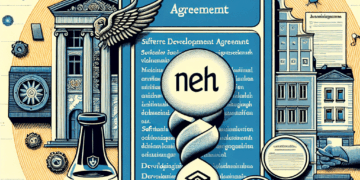No products in the cart.
Introduction
A software development contract is a legal agreement between a client and a software developer (or software development company) that specifies the terms and conditions for the development of software. This contract is critical to clarify the expectations of both parties and avoid potential conflicts. In this article, we will examine the key elements and components of a software development contract.
Key Facts
- Scope of services: The contract defines which software is to be developed, including functions, milestones and schedules.
- Payment: Payment details, such as a flat fee or hourly billing, as well as due dates must be clearly regulated.
- Intellectual property rights: Clarification of who owns the rights to the software and intellectual property.
- Confidentiality: A clause protects confidential information between client and developer.
- Warranty: Ensuring that the software is error-free and meets the specifications.
- Support and maintenance: Clarification of responsibilities for support after software completion and remuneration.
- Termination: Conditions for terminating the contract and the rights and obligations of both parties must be defined.
Key elements of a software development contract
1. definition of the scope of work (SCOPE OF WORK)
The contract should clearly define what software is to be developed, including specific features and requirements. This section may also include milestones and timelines for development.
2. remuneration and terms of payment
It should be clearly defined how and when the developer will be paid for his work. This can be a flat fee, hourly billing, or a combination of both. Payment schedules and due dates should also be provided.
3. intellectual property rights
This section governs who owns the rights to the developed software and related intellectual property. As a rule, the client retains the rights to the software, but this should be clearly stated in the contract.
4. confidentiality
Often, the contract contains a confidentiality clause that requires both parties to keep information exchanged under the contract confidential.
5 Warranty and liability
The contract should include warranty terms stating that the software is free of defects and conforms to the specifications set forth in the contract. In addition, it should be regulated how liability issues are dealt with.
6. support and maintenance
It should be specified whether the developer is responsible for support and maintenance after completion of the software and how these services are remunerated.
7. termination
Conditions under which the contract may be terminated should be clearly defined, including the rights and obligations of both parties in the event of termination.
8 Applicable law and dispute resolution
The contract should specify the applicable law and how disputes arising under the contract will be resolved.
Important considerations
It is important that both parties carefully review the contract and ensure that it adequately reflects their interests and expectations. It may be advisable to consult a lawyer to ensure that the contract is legally sound.
Conclusion
A software development contract is an essential tool that provides clarity and security for both parties in a software development project. It is important that the contract is detailed and clear and covers all relevant aspects of the cooperation to avoid future conflicts.





















